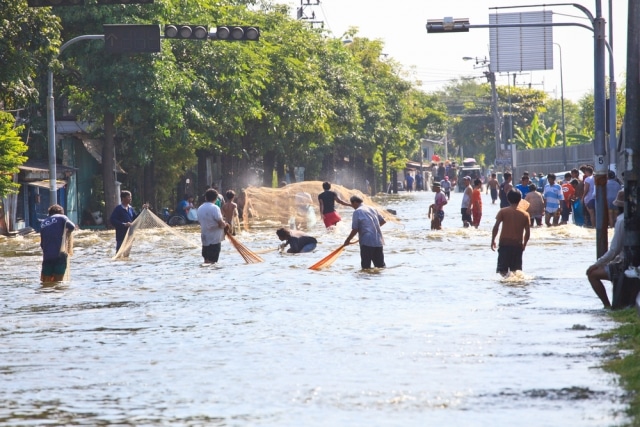While U.S. politicians continue to disagree on global warming and its potentially catastrophic consequences, Defense Secretary Chuck Hagel has just released a report saying climate change will have serious implications for national security.
“Rising global temperatures, changing precipitation patterns, climbing sea levels, and more extreme weather events will intensify the challenges of global instability, hunger, poverty, and conflict,” Hagel said in the introduction to the report — Department of Defense: 2014 Climate Change Adaptation Roadmap.
“They will likely lead to food and water shortages, pandemic disease, disputes over refugees and resources, and destruction by natural disasters in regions across the globe.”
Hagel said the U.S. military refers to climate change as a “threat multiplier” because it has the potential to exacerbate many of today’s challenges – from infectious disease to terrorism.
He also said a changing climate will have significant impacts on the military and the way it executes its missions, including supporting civil authorities and providing humanitarian assistance and disaster relief in the face of more frequent and more intense natural disasters.
Coastal installations are vulnerable to rising sea levels and increased flooding, he said in the 16-page report, while droughts, wildfires, and more extreme temperatures could threaten many training activities.
“We must also work with other nations to share tools for assessing and managing climate change impacts, and help build their capacity to respond. Climate change is a global problem. Its impacts do not respect national borders. No nation can deal with it alone. We must work together, building joint capabilities to deal with these emerging threats.”
Hagel added that the potential consequences of climate change means politics or ideology must not get in the way of sound military planning.
He said the Department of Defence (DoD) is almost finished a baseline survey that assesses the vulnerability of the U.S. military’s more than 7,000 bases, installations, and other facilities.
“In places like the Hampton Roads region in Virginia, which houses the largest concentration of US military sites in the world, we see recurrent flooding today, and we are beginning work to address a projected sea-level rise of 1.5 feet over the next 20 to 50 years,” he said.
In a related speech Monday to the Conference of Defense Ministers of the Americas in Arequipa, Peru, Hagel was quoted as saying that the loss of glaciers due to climate change will strain water supplies in several areas of the world.
“Destruction and devastation from hurricanes can sow the seeds for instability,” he said. “Droughts and crop failures can leave millions of people without any lifeline, and trigger waves of mass migration.”
He said that while those kinds of events have occurred in other regions of the world, and there are worrying signs that climate change will create serious risks to stability in the Americas.
“Two of the worst droughts in the Americas have occurred in the past 10 years … droughts that used to occur once a century. In the Caribbean, sea level rise may claim 1,200 square miles of coastal land in the next 50 years, and some islands may have to be completely evacuated. According to some estimates, rising temperatures could melt entire glaciers in the Andes, which could have cascading economic and security consequences.”
Uncertainty regarding climate change is no excuse for delaying action, an accompanying DoD news story quoted Hagel as saying.
“While scientists are converging toward consensus on future climate projections, uncertainty remains. But this cannot be an excuse for delaying action,” Hagel said.
“Every day, our military deals with global uncertainty. Our planners know that, as military strategist Carl von Clausewitz wrote, ‘all action must, to a certain extent, be planned in a mere twilight.’ ”
According to the New York Times, the new report marks a significant shift for U.S. military strategic planning.
“In the past, the Pentagon’s response to climate change has focused chiefly on preparing military installations to adapt to its effects, as in protecting coastal naval bases from rising sea levels,” the NYT article said.
“But the new report calls on the military to incorporate climate change into broader strategic thinking about high-risk regions — for example, the ways in which drought and food shortages might set off political unrest in the Middle East and Africa.”
The article added that the Pentagon’s increased emphasis on the threats of climate change is aimed in part at building support for a United Nations agreement, to be signed next year in Paris, that would require the world’s largest producers of planet-warming carbon pollution to slash their emissions.
The Los Angeles Times said Peruvian President Ollanta Humala noted in opening remarks of the defense summit that “if we don’t do anything to address the effects of climate change, there will be nothing left.”
Image credit: Villagers fishing in streets after Thailand flood via Shutterstock.
Subscribe to our newsletter
Stay up to date with DeSmog news and alerts






